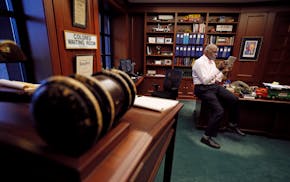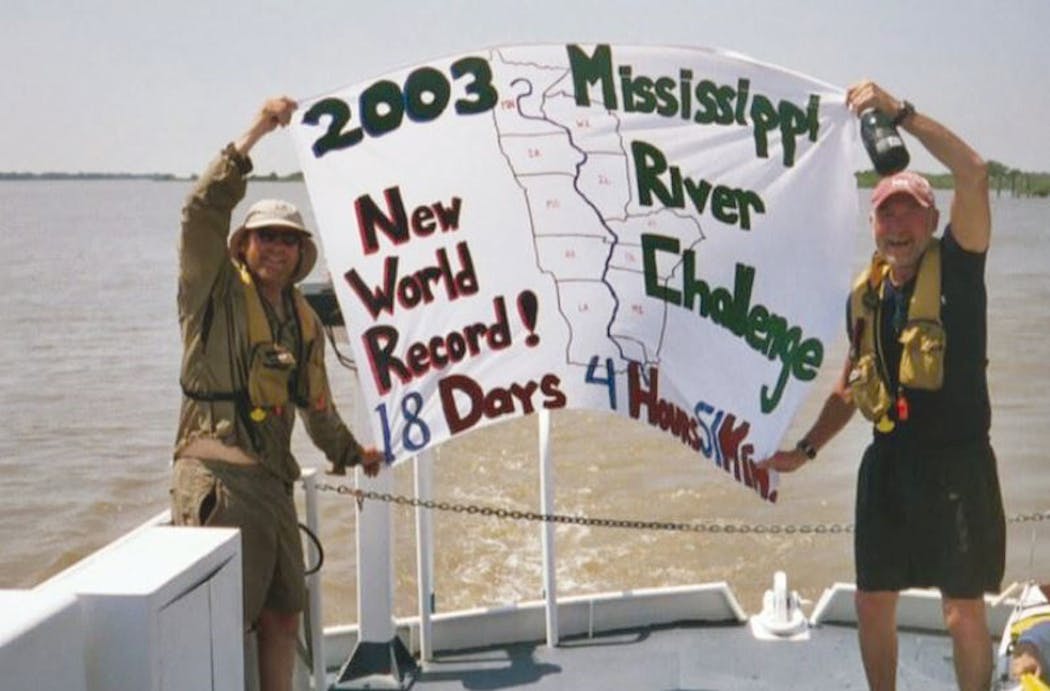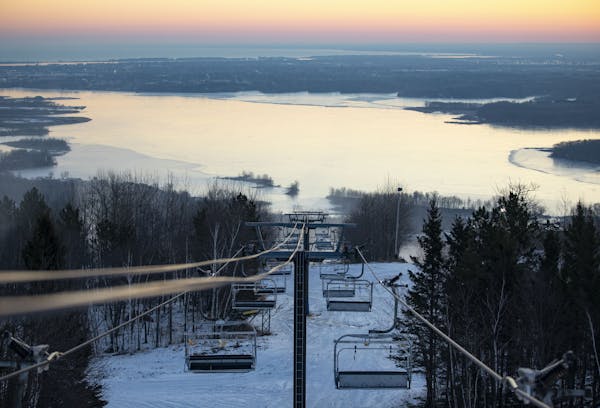Four canoe adventurers left the Minnesota headwaters of the Mississippi River on Tuesday with an audacious plan around a timeless act: Paddling a canoe. They, however, are propelling a 23-foot Wenonah nearly nonstop and as fast as possible the entire 2,300-plus miles of the river.
Coincidentally or not, they're in the wake of another foursome with Minnesota connections deep into its own attempt.
If both or either are successful, they'll arrive in the river delta around Pointe à La Hache, La., at the Gulf of Mexico about 18 days later and lay claim to the Guinness World speed record for a paddle of the Mighty Mississippi. Yet so much presents obstacles between now and then, from mercurial weather to water levels to their own stamina and well-being. Even barge traffic.
In an interview before the attempt that began just this week, leader Scott Miller of Minneapolis acknowledged the barriers but said the constant emotion during months of organizing, marathon training sessions and more amounts to a single thing: joy.
"There is a particular joy in undertaking a goal with other people in the outdoors," said Miller, 45, who paddled with friends 2,250 miles from St. Cloud to Hudson Bay in 2005. "And in particular there is something wonderful about going down a river. You never know what is around the corner. Your interest is always piqued."
That collective exuberance has fueled them close to the metro by now if their record attempt is on track.
Records set — and records attempted — on the Mississippi travel back to the first mark in 1937. Three men named Joe Tagg, Gerald Capers and Charles Saunders made the trip in 56 days, recorded by the Guinness keepers as the "Fastest Time to Row the Length of the Mississippi River by a Team." Most attempts have been by canoe, although the record guidelines permit an attempt by kayak, rowing boat or scull, too.
The current record of 18 days, four hours and 51 minutes was set by Bob Bradford of Michigan, and Clark Eid, then of Connecticut, on May 10, 2003. Miller said the two have been great resources and supporters, a common practice in the tight-knit worlds of niche endurance sports like long-distance paddling. For example, the record holders have provided their split times every 100 miles and other intelligence, which has helped Miller's crew dial in their own plan to see if it's got a shot.
Not surprisingly, the record has roots in previous tries by canoe-loving Minnesotans.
In 1980, KJ Millhone of Minnetonka and Steve Eckelkamp lowered a 1978 mark by several days when the two completed the route in 35 days, 11 hours and 27 minutes. Since 2003, there have been at least three unsuccessful attempts, one again involving Millhone in 2018. Miller had organized an attempt with Millhone and two others in 2020 when the COVID-19 pandemic killed the plan.
Now, Millhone, 62, his daughter Casey and two others are gunning for the speed record, too. They launched in late April and are currently ahead of record pace.
Eid said he was "flattered" at the twin efforts to break their longstanding mark and recounted the taxing, sleepless days and risks seen and unseen.
"There is a lot of luck," Eid added, "but luck favors the well-prepared."
Honing a routine
Months of planning that began in 2018 were scuttled in 2020. Miller turned to the long-distance paddling community to recruit the current crew members. Some came with ties to the MR340, a popular 340-mile race on the Missouri River that he competed in last year. Crew member Perry Whitaker, 59, of St. Louis, is a 12-time finisher at the MR340.
Joel Ford, 36, of Fallston, Md., is a former team member of a U.S. national championship adventure racing squad.
Adam Macht, 36, who rounds out the Wenonah crew, works for an outfitter in Ely and has deep experience in the Boundary Waters Canoe Area Wilderness and Quetico Provincial Park in Ontario.
Miller also has secured a support crew of 20 volunteers on water and onshore. Support boats will shadow the team once it's in St. Paul, with MR340 race director Scott Mansker at the helm. Marine radios will be used to communicate with commercial boat traffic, like barges big enough to eclipse the sun.
Mike "Moose" Dougherty is the uncle of Miller's wife, Heidi. He has helped coordinate logistics from land, scouting portages around dams, like the ones in Brainerd and Little Falls, and locking in on boat ramps where the paddlers will stop for planned breaks. Dougherty said several volunteers from out of state came in response to Facebook posts, and many have connections to Miller's days with Many Point Scout Camp in northern Minnesota.
The foursome has honed its routine in the canoe with multiple long-distance training trips, including a final two-day affair in April, covering 264 miles from north of Aitkin to the metro. There also were training trips in St. Louis in March and last spring from the Twin Cities to Winona, always mindful of the watch and splits to hit. The four want to build a big lead at the start of their attempt this week. (Track their attempt here.)
"Dress rehearsals tried to mimic everything," Miller said.
The group operates in six-hour shifts before changing positions, with breaks planned at the shore at boat ramps or marinas to grab nutrition or gear or take a hasty restroom break. The canoe is customized with bulkheads that section off the middle from the bow and stern, allowing space for one paddler to rest or alternate with the second person mid-canoe, so a third paddle always is in the water, too.
For all the attention on speed, Miller said their paddle strokes will focus on efficiency. Employing a pedal-operated rudder will help, too. He said the journey marries his athleticism with his love of canoeing, and like any good athlete, he has trained to operate economically while managing the physical stress. Like, say, a marathoner to a 10-kilometer runner, Miller said he's built for ultradistances as opposed to sprints.
"Obviously it's taxing 24/7, day after day, but in any given moment you are working harder when you run around your block," he said.
'The river decides'
The control areas — training, organization, teamwork, logistics — have become second nature, according to Miller and Dougherty, with an emphasis on minimizing time. "Most things you can do on the river, so keep 'em moving," Dougherty added.
Elements like weather and water levels in the Mississippi and its tributaries that have torpedoed or bolstered other speed-record attempts are another thing. Water will be low in some places, high in others — and the higher, the faster the flow. In 2003, the Ohio River was at flood stage where it meets the Mississippi in southern Illinois, providing a "big push" to the eventual record setters, Miller said. This time around, the group anticipated some slow going these first few days out of the headwaters headed toward Bemidji. Of course, there, too, are numerable dams to portage; as many as 27 lock and dams to navigate between the metro and St. Louis; countless barges to avoid; and who knows what else. And that is part of the adventure.
Dougherty said the friendliness and kindness of support people and strangers met over time has stuck out above most else thus far. And with those gestures has come sage river wisdom. Mike Clark of Big Muddy Adventures in St. Louis has offered some.
"(He) said the river decides if you are going to break the record or not. I think there is a lot of truth in that," he added. "You have to be flexible and ready for whatever comes at you."
Miller thinks his group is prepared to have a say, too.
"There is something about the camaraderie of having a shared goal that no one is making you do," he said. "Everyone chose this as something they think is fun, and we're all in this together. Literally, in the same boat."
What is the 'House settlement,' and what does it mean for the Gophers and NCAA?

Souhan: Anxiety and depression in the NFL helped inspire Lindsey Young's children's book

Twins lose second in a row to Blue Jays as bullpen falters late

Twins pitcher Ober struggling to regain fastball velocity



